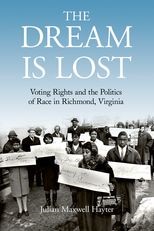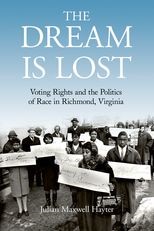The Dream Is Lost: Voting Rights and the Politics of Race in Richmond, Virginia
The Dream Is Lost: Voting Rights and the Politics of Race in Richmond, Virginia
Cite
Abstract
The Dream Is Lost describes more than three decades of national/local racial politics and the unintended consequences of the civil rights movement. It uses the mid-twentieth-century urban history of Richmond, Virginia, to explain the political abuses that often accompanied American electoral reforms. The rights embodied in the Voting Rights Act of 1965 cannot be explained by separating the mobilization of black voters, on one hand, and federal policy directed toward race, on the other. The story first examines the suffrage crusades that predated the Voting Rights Act and how an organization called the Richmond Crusade for Voters mobilized African Americans a decade prior to 1965. As the Crusade mobilized voters, its members met firm resistance from their white counterparts. Local people and federal officials beat back the forces of white resistance by implementing majority–minority district systems. Although the reapportionment revolution led directly to the election of a black-majority city council in Richmond in 1977, it, too, had unintended consequences. The very forces that made Richmond’s majority–minority district system possible—an increase in African American populations in densely packed enclaves, unremitting residential segregation, white flight, and urban retrenchment—were the same that brought about intensifying marginalization in black communities during the twilight of the twentieth century. This story follows black voter mobilization to its logical conclusion: black empowerment and governance. It demonstrates that mid-twentieth-century urban redevelopment left a lasting impression on America’s cities. Richmond’s black-majority council struggled to negotiate the tension between rising expectations in black communities, sustained white resistance, and structural forces beyond the realm of politics.
-
Front Matter
- Introduction
-
1
Strictly Political: Racial and Urban Politics and the Rise of the Richmond Crusade for Voters before 1965
-
2
Systematically Done In: Black Electoral Empowerment, Vote Dilution, and the Push for Annexation after the Voting Rights Act
-
3
From Intent to Effect: The Long Struggle for Voting Rights Litigation during the 1970s
-
4
“The Dream Is Lost”: Henry Marsh and Black Governance in an Era of White Political Resistance
-
5
“All He Gave Me Was a Foot”: Black Technocrats, Richmond’s Urban Woes, and the Crisis of the Crusade for Voters
- Conclusion
-
End Matter
Sign in
Personal account
- Sign in with email/username & password
- Get email alerts
- Save searches
- Purchase content
- Activate your purchase/trial code
Institutional access
-
Sign in through your institution
- Sign in with a library card Sign in with username/password Recommend to your librarian
Institutional account management
Sign in as administratorPurchase
Our books are available by subscription or purchase to libraries and institutions.
Purchasing information| Month: | Total Views: |
|---|---|
| October 2022 | 2 |
| October 2022 | 2 |
| October 2022 | 2 |
| October 2022 | 2 |
| October 2022 | 3 |
| October 2022 | 2 |
| October 2022 | 2 |
| October 2022 | 2 |
| October 2022 | 2 |
| October 2022 | 2 |
| October 2022 | 2 |
| October 2022 | 2 |
| October 2022 | 2 |
| October 2022 | 2 |
| October 2022 | 2 |
| October 2022 | 2 |
| October 2022 | 2 |
| November 2022 | 1 |
| January 2023 | 2 |
| February 2023 | 2 |
| April 2023 | 1 |
| April 2023 | 1 |
| April 2023 | 2 |
| August 2023 | 2 |
| August 2023 | 2 |
| August 2023 | 3 |
| October 2023 | 1 |




Get help with access
Institutional access
Access to content on Oxford Academic is often provided through institutional subscriptions and purchases. If you are a member of an institution with an active account, you may be able to access content in one of the following ways:
IP based access
Typically, access is provided across an institutional network to a range of IP addresses. This authentication occurs automatically, and it is not possible to sign out of an IP authenticated account.
Sign in through your institution
Choose this option to get remote access when outside your institution. Shibboleth/Open Athens technology is used to provide single sign-on between your institution’s website and Oxford Academic.
If your institution is not listed or you cannot sign in to your institution’s website, please contact your librarian or administrator.
Sign in with a library card
Enter your library card number to sign in. If you cannot sign in, please contact your librarian.
Society Members
Society member access to a journal is achieved in one of the following ways:
Sign in through society site
Many societies offer single sign-on between the society website and Oxford Academic. If you see ‘Sign in through society site’ in the sign in pane within a journal:
If you do not have a society account or have forgotten your username or password, please contact your society.
Sign in using a personal account
Some societies use Oxford Academic personal accounts to provide access to their members. See below.
Personal account
A personal account can be used to get email alerts, save searches, purchase content, and activate subscriptions.
Some societies use Oxford Academic personal accounts to provide access to their members.
Viewing your signed in accounts
Click the account icon in the top right to:
Signed in but can't access content
Oxford Academic is home to a wide variety of products. The institutional subscription may not cover the content that you are trying to access. If you believe you should have access to that content, please contact your librarian.
Institutional account management
For librarians and administrators, your personal account also provides access to institutional account management. Here you will find options to view and activate subscriptions, manage institutional settings and access options, access usage statistics, and more.